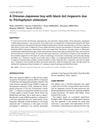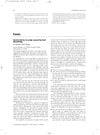Search
for
Sort by
Research
150-180 / 1000+ results
research Multi-Ancestry Tandem Repeat Association Study of Hair Color Using Exome-Wide Sequencing
Tandem repeats significantly influence hair color, especially darker shades, across different ancestries.

research What Every Physician Should Know About Polycystic Ovary Syndrome
Doctors should know how to diagnose and treat PCOS, which often involves checking for high male hormone levels and using medications to manage symptoms.

research Clinical Experience of Professor Ma Shuanquan in Treating Androgenetic Alopecia
Professor Ma Shuanquan treats hair loss by using Chinese medicine to improve liver, spleen, and kidney health.

research Bioboard
In 2011, there were major scientific breakthroughs in cancer treatment, immunity, Parkinson's, virus simulation, schizophrenia, hair growth, lung cancer, and medical grafts.

research An Efficient, Non-Invasive Approach for In Vivo Sampling of Hair Follicles: Design and Applications in Monitoring DNA Damage and Aging
A new painless method to collect hair follicles helps study DNA damage and aging.

research Shampoos And Hair Conditioners
Good haircare and communication with doctors are key for managing hair loss.

research Immunological And Some Biological Biomarkers Investigation In Patients With Systemic Lupus Erythematosus
No single biomarker is reliable enough for diagnosing and assessing SLE.

research Prunus Mira Koehne in Sichuan, China: Recorded History as a Medicine and Food, Modern Applications, Distribution, and Ethnobotanical Investigations
Prunus mira Koehne is valuable for hair growth and has potential for sustainable use, but needs more research and conservation.

research A Chinese-Japanese Boy with Black Dot Ringworm Due to Trichophyton Violaceum
A Chinese-Japanese boy had a rare fungal infection on his scalp and skin, likely caught in China.

research Failures of DNA Methylation Clocks and Development of a Noise Barometer for Measuring Epigenetic Pressure of Aging and Disease
Elastic Net DNA methylation clocks are inaccurate for predicting age and health status; a "noise barometer" may better indicate aging and disease.

research Optimizing Skin Disease Diagnosis: Harnessing Online Community Data With Contrastive Learning and Clustering Techniques
Researchers improved a skin disease diagnosis model using online images, achieving up to 49.64% accuracy.

research Cases: Severe Burns to Scalp Caused by Hair Bleaching
A woman got severe scalp burns from a salon's improper hair bleaching treatment.

research A Management Model to Promote Hair Growth for Androgenetic Alopecia Cases Through Yoga and Ayurveda
Yoga and Ayurveda, including stress management and herbal oil use, can potentially reduce hair loss and promote hair growth, with further research needed for therapy protocols.

research Advanced Nanocarrier- and Microneedle-Based Transdermal Drug Delivery Strategies for Skin Diseases Treatment
Advanced nanocarrier and microneedle drug delivery methods are more effective, safer, and less invasive for treating skin diseases.

research Determination of Follicular Direction and Preparation of Micrograft Holes for Hair Transplantation
The technique improved hair transplant success and patient satisfaction by matching hair growth direction.
research Eclipta Alba (Bhringraj): A Promising Hepatoprotective and Hair Growth Stimulating Herb
Eclipta alba (Bhringraj) helps protect the liver and promotes hair growth.
research Mathematical Model for Alopecia Areata
The model showed that immune system guardians and the cytokine interferon-γ are key in alopecia areata progression.
research In Vitro Performance Analysis of a Minoxidil Thermosensitive Gel With Reduced Runoff for Eyebrow Hair Growth
The new minoxidil gel reduces runoff and improves eyebrow hair growth.

research Telogen Effluvium: A Comprehensive Review
The document concludes that Telogen Effluvium is a hair loss disorder that can be assessed with the modified wash test and may be treated with clobetasol foam, with patient management being important.

research Primary Cicatricial Alopecia: Diagnosis and Treatment
Primary cicatricial alopecia, a rare disorder causing permanent hair loss, is hard to diagnose and treat, with treatments like anti-inflammatory drugs and steroids offering varied results and no guaranteed cure. Psychological support for patients is important, and future research should aim to identify causes of the condition.
research Nanoemulgel: For Promising Topical and Systemic Delivery
Nanoemulgel is a better way to deliver drugs through the skin for various conditions.
research Hair Follicle Development of Rex Rabbits Is Regulated Seasonally by Wnt10b/β-Catenin, TGFβ-BMP, IGF1, and EGF Signaling Pathways
Winter provides the best fur quality for Rex rabbits due to seasonal changes in specific signaling pathways.

research Global Impact of Coronavirus Disease 2019 (COVID-19)
COVID-19 has widely affected health, various industries, and the economy, but also led to more remote work and less pollution.

research Dandruff Lesional Scalp Skin Exhibits Epidermal T Cell Infiltration and a Weakened Hair Follicle Immune Privilege
Dandruff is linked to increased T cells and weakened immune protection in hair follicles.

research Beta-Nicotinamide Mononucleotide Promotes Cell Proliferation and Hair Growth by Reducing Oxidative Stress
NMN could potentially treat hair loss by reducing oxidative stress and improving cell health.
research Hidradenitis Suppurativa: A Practical Review of Possible Medical Treatments Based on Over 350 Hidradenitis Patients
Different treatments for Hidradenitis suppurativa range from antibiotics and hormonal therapies to surgery, depending on severity.

research From Piezoelectric Nanogenerator to Non-Invasive Medical Sensor: A Review
Piezoelectric Nanogenerators are promising for non-invasive health monitoring but need efficiency and durability improvements.

research Characteristics of Telogen Effluvium in COVID-19 in Western Iran (2020)
COVID-19 can cause temporary hair loss, often starting around 7-8 weeks after recovery, with factors like Vitamin D deficiency, other diseases, medication, and stress potentially contributing.
research Retinoic Acid Exerts Sexually Dimorphic Effects on Muscle Energy Metabolism and Function
Retinoic acid affects male and female muscle energy use and function differently.